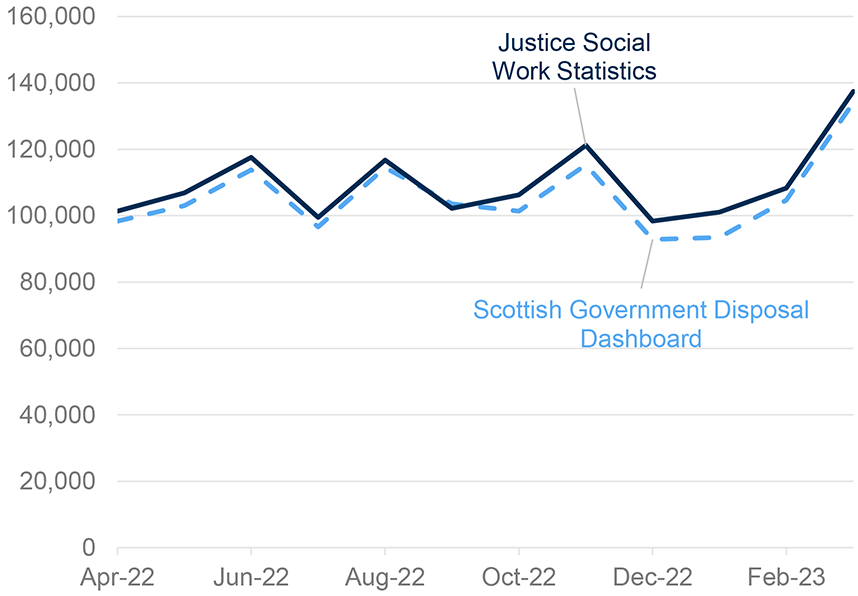Community Payback Orders – Unpaid Work or Other Activity Requirements – May 2024
The report models the number of hours of unpaid work or other activity outstanding as part of community payback orders and how this has changed over time.
Data and Methodology
The information in Unpaid work hours requirements progressed in 2022-23 section is sourced from accredited official statistics. The high level data has been published as part of the Justice Social Work Statistics 2022-23. There has been some new analysis done to support this narrative and this data can be found in the supporting excel document.
In Unpaid work hour imposed section, the Scottish Government Justice Analytical Services Criminal Disposals Dashboard publishes management information based on the Scottish Courts and Tribunal Service’s (SCTS) administrative database (COPII). Information from this administrative database is based on management information and an approximation was created for number of hours imposed.
Chart 3: Comparing two different data sources which show the number of hours imposed as part of unpaid work requirements.
Unpaid work hours imposed, Scotland, 2022-23

This graph has two line that show the same trend between the two data sources over the 12 months with a slight gap.
The management information used in the disposals dashboard shows the data at charge level, whereas the local authority data is at CPO unit level. For this model, it was adjusted to be nearer the unit level data by using only the maximum number of unpaid work hours per case-accused. Whilst this is not exactly how CPO unit level data is calculated, it did give a good approximation. For 2022-23, this average maximum number of unpaid work hours per case-accused nationally was about 3.6% lower than the actual CPO unit level data. (Chart 3). The disposals dashboard management information has been used as an approximation for 2023-24. Without this data, this information on hours imposed would be 18 rather than six months behind the management information collected on unpaid work hours.
Management information on unpaid work hours section uses management information collected quarterly from justice social work teams within local authorities. There are a number of quality issues that must be considered when this data is being used. These are provided in Introduction and Management information on unpaid work hours section. This information is considered an estimation and there is variation due to the collection time, COVID-19 related restrictions (earlier data), statistical approximation being used for missing data and seasonality of unpaid work hours being imposed.
Additional information
As two of the data sources for this publication are management information, revisions may occur. Any revisions will be flagged in the current publication and the current data will supersede any previously published. Other statistics are taken from Justice Social Work Statistics 2022-23, which has its own revision policy.
The aim is to publish this supplementary publication at least every nine months. The need to continue collecting the management information on outstanding unpaid work hours will be reviewed annually by Scottish Government with advice sought from stakeholders. This collection was originally intended to support decision making through the COVID-19 years and the subsequent recovery period. So far it has been agreed that data will be collected during the financial year 2024-25.
England, Wales, and Northern Ireland have different judicial systems. This makes comparing information on Community Payback Orders statistics difficult. Statistical information on their judicial systems can be found at:
- England and Wales: Statistics at Ministry of Justice
- Northern Ireland: Department of Justice
There are a range of other statistics on the Scottish judicial system:
Contact
Email: JSW_statistics@gov.scot
There is a problem
Thanks for your feedback